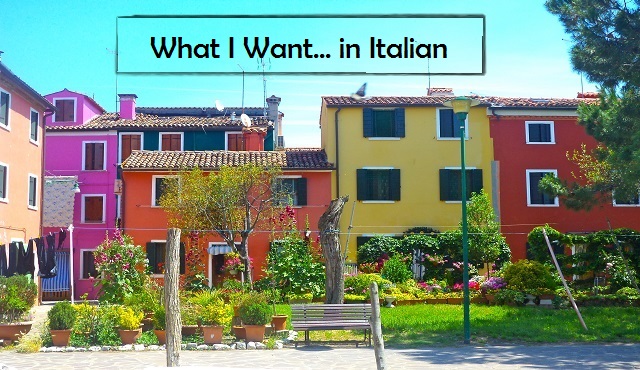Volere is an Italian verb that means “to want” or “to need.” Volere ends in -ere, which makes it a second conjugation verb. However, it is also an irregular verb, and the stem will change for all forms except the voi form. As you can imagine, volere is a very important verb to know in order to communicate what your needs are while in Italy, and you will find the io and tu forms are very important to commit to memory.
The verb conjugation table below is presented with the visual learner in mind, and this includes color-coding for easy memorization. The irregular verb forms for the present tense of volare are given in brown, and the regular voi conjugation is given in green. Notice also that the stressed syllable for each verb has been underlined.
Volere – to want (present tense)
| io | voglio | I want |
| tu | vuoi | you (familiar) want |
| Lei
lei/lui |
vuole | you (polite)want
she/he wants |
| noi | vogliamo | we want |
| voi | volete | you all want |
| loro | vogliono | they want |
The conditional form of volere is also very useful, since it is a polite way to ask for something from a clerk at a store or a waiter at a restaurant. The io conditional form of volere is also irregular, and is vorrei, which means, “I would like.”
Use the polite vorrei and say, “I would like…” instead of the more demanding “Voglio…” when asking for what you need in Italy; politeness is usually rewarded with the same in return. Conditional verb forms are generally studied at the intermediate level, but vorrei is one verb that every student of Italian should learn right from the start!
Volere – to want (conditional tense)
| io | vorrei | I would like |
So, now we know how to tell someone what we want. Or do we? After “I want,” we often need to add another verb to express what we want to do – to go, to return, to buy, etc.
To express what you want, first conjugate the verb volere into one of the first conjugation, or io forms: voglio or vorrei. Then simply add the infinitive form of the action verb directly after the conjugated form of volere. This is the same as we would do in English! The verb volere is known as a helping verb for the way that it modifies, or adds to, the meaning of the main verb in the sentence.
See below for Italian example sentences that use the helping verb volere. Both the helping verb and the main verb in the sentence have been underlined.
Notice that the subject pronoun io is left out of the Italian phrases, as usual. Remember that when going “to” a country, region, or large island in Italy, you must use the Italian preposition “in” (which has the same meaning as the English word “in”). However, when going to a city, town, or a small island in Italy, you must use the preposition “a,” for “to.”
| Voglio andare in Italia.
Voglio andare a Roma. |
(I) want to go to Italy.
(I) want to go to Rome. |
| Vorrei comprare un biglietto. | (I) would like to buy a ticket. |
| Voglio tornare lunedì. | (I) want to return Monday. |
Of course, the verb volere can also be followed by a noun, the “object of our desire”! Some examples:
| Voglio un’appartamento a Roma. | (I) want an apartment in Rome. |
| Vorrei quella macchina rossa! | (I) would like that red car! |
| Voglio una grande festa quando faccio cinquanta! | (I) want a big party when I turn 50! |
After learning how a visitor to Italy should express their needs using the verb volere, it is important to realize how the verb desiderare comes into play in every day life. When one is out and about shopping in Italy, desiderare is the verb most commonly used by a clerk or shopkeeper to ask a customer what they want. Desiderare is most often used with the meaning “to want” in the business setting, but can also mean “to desire” orcan have the more forceful meanings of “to demand” or “to require” (another person to do something).
Desiderare is a regular -are verb, and the polite “you” form, “Desidera..?” is commonly by shopkeepers when a customer enters a store. This is a shorthand way to ask, “Can I help you?” Of course, a customer may also hear, “Posso aiutarla?” for the official, polite, “May I help you?”
An example conversation between a traveler, Caterina, and a ticket clerk, Rosa, is given below. In this example, directly after Rosa, the clerk at the ticket counter says, “Buon giorno,” she asks, “Dove desidera andare?” as a way of inviting Caterina to purchase a ticket. Desidera is now the helping verb and is conjugated into its “polite you” form, while andare follows in the infinitive.
Caterina answers the initial question in the dialogue with the polite vorrei but then later on uses the io form of desiderare, which is desidero; desiderare can, of course, be used by the customer as well as a clerk or salesperson!
Read the dialogue below through as an example of how these words might be used. To hear the full dialogue between Caterina and Rosa on your computer or smartphone, just click here: Chapter 4: At the Train station.
| Rosa: Buon giorno. Dove desidera andare? |
| Hello. Where (do) you (pol.) want to go? |
| Caterina: Vorrei andare a Milano. |
| (I) would like to go to Milan |
| Rosa: Prima o seconda classe? |
| First or second class? |
| Caterina: Desidero la prima classe, diretto, per Milano, per favore. |
| (I) want first class, direct, for Milan, please. |
There are, of course, many more situations in which one could ask for what they want using voglio, vorrei, or desiderare. How many more can you think of?
Remember how to use the verbs volere and desiderare to ask for what you want in Italian and I guarantee you will use these verbs every day!
 Fra Noi Embrace Your Inner Italian
Fra Noi Embrace Your Inner Italian







